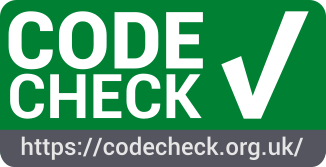CODECHECK
Overview

CODECHECK verifies that your code runs and successfully reproduces the key results from your publication. Researchers at 4TU institutes can now request this service through a collaboration between TU Delft DCC and 4TU.ResearchData. Successful checks result in a public certificate and a "Code Works" badge on your software record.
What is CODECHECK
CODECHECK is a community-driven initiative that supports computational reproducibility. A volunteer codechecker reruns the code and data associated with a publication to ensure that it reproduces the expected outputs — such as figures, tables, or datasets.
Please note: CODECHECK does not assess scientific correctness or code quality — only whether the code runs and produces the reported results.
CODECHECK Workflow
- Submit
- You provide software, data, and a linked publication or preprint to 4TU.ResearchData. See section "How to Request CODECHECK" for details.
- Assigned
- A codechecker is assigned to your submission and will contact you if clarification or additional information is needed.
- Reproduce
- The codechecker independently runs your software to reproduce the main computational results (e.g. figures, tables, or datasets). If necessary, you may be contacted to clarify the setup, fix issues, or provide additional instructions.
- Certify
- Upon successful reproduction:
- A Certificate of Reproducible Computation is published via Zenodo.
- A "Code Works" badge is added to the 4TU.ResearchData landing page.
Who Performs CODECHECKs
At TU Delft, checks are carried out by the Digital Competence Centre (DCC) or faculty data stewards.
At TU/e, WUR, and University of Twente, checks are supported by the
4TU.ResearchData team and a network of
volunteer codecheckers.
How to Request a CODECHECK
Researchers publishing software via 4TU.ResearchData can now request a CODECHECK directly through the metadata submission form.
Tick the box (for software publications only):
☑ I would like to request a reproducibility check of scientific results produced with my software.
What happens next?
After submission, you will receive an email with next steps. If the necessary materials aren't already included in the dataset,
we may ask you to share:
- A publication or preprint that explains the results
- Any required datasets
- Instructions or scripts for running your code
If everything is already provided in the submission (e.g. in a README file), no additional action may be needed.
Already have a CODECHECK certificate?
You can also link an existing one by entering its DOI in the metadata form.
Want to add a CODECHECK certificate to software you've already published?
We can retroactively add badges and certificates to existing 4TU records.
Contact us at: [email protected]
Required Materials
To complete a CODECHECK, your software publication should include:
- A publication or preprint that clearly presents the results to be reproduced
- The data used to generate those results
- Clear instructions for running the code (e.g. a README.md file, workflow script, or notebook)
The better documented your workflow, the smoother the process will be — and the more likely your work will be reused and cited by others.
Eligibility
This service is currently available to researchers affiliated with the 4TU Federation:
- TU Delft (TUD)
- Eindhoven University of Technology (TU/e)
- Wageningen University & Research (WUR)
- University of Twente (UT)
Examples of CODECHECKed Software
The following software records hosted on 4TU.ResearchData have successfully undergone CODECHECK:
- Source code underlying the publication: Optimal Graph Stretching for Distributed Averaging
- TWORIT: Theoretical solver and Waveguide Optimization for Radiating Irregular Tapered-Cones - A tool for calculating the S parameters and Far Fields of a cascaded cylindrical waveguide structure
- Data and code underlying the publication: Scalable control synthesis for stochastic systems via structural IMDP abstractions
- Implementation Regarding Publication "Fuzzy-Logic-based model predictive control: A paradigm integrating optimal and common-sense decision making"
CODECHECK Timeline
This service is currently running as a pilot. We are using this phase to gauge interest and demand across the 4TU community.
As such, we cannot yet guarantee a fixed turnaround time for CODECHECKs. However, most checks completed so far have been done within one month of submission.
Timelines may vary depending on the complexity of the code, availability of data, and whether additional clarification is needed from the author. We will keep you informed and aim to complete the check as efficiently as possible.
Getting Involved
Are you interested in improving reproducibility in your field — or just enjoy running other people's code?
Become a codechecker
Anyone with experience in running code and curiosity about open research is welcome to join the CODECHECK community.
Learn how to get started here:
https://codecheck.org.uk/get-involved/
Support reproducible publishing
If you're a journal editor, research group lead, or institutional support staff,
we'd love to hear from you about how to integrate CODECHECK into your workflows.
Get in touch: [email protected]




